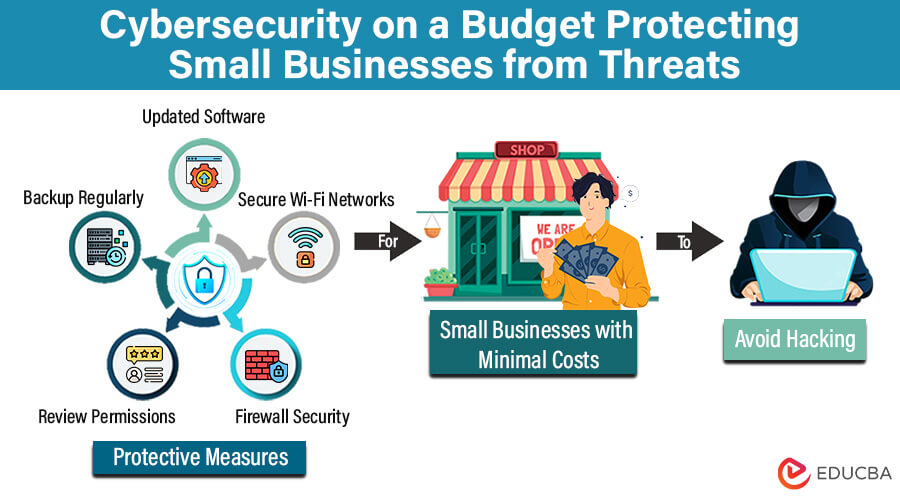Cybersecurity: Budget Protecting Small Businesses
Irrespective of their size or resources, small businesses in recent times are not safe from internet dangers. Cyber offenders often target smaller enterprises because they have poor security systems and insufficient assets, exposing them to attacks that can result in financial losses, data breaches, and negative reputations.
Nevertheless, safeguarding your small business against cyber threats does not need to be too expensive. Through less costly ways of increasing cybersecurity for small enterprises, they can reduce the risks and protect their operations. This article will give insights into some affordable ways your small business can enhance cybersecurity.
Top 5 Cybersecurity: Budget Protecting Small Businesses
-
Keep software updated
Obsolete software is one entry point through which hackers access confidential information. These businesses need to regularly update their software, including web browser operating systems, among other applications. Many times these updates provide security patches to correct known weaknesses and guard against new threats.
In addition, out-of-date software also slows down the pace of your system, affecting productivity levels negatively. This way, small businesses will ensure that they have protection measures in place whenever they update their software without investing heavily in expensive cybersecurity tools all the time by just keeping software up-to-date.
-
Backup files regularly
For small businesses, it is essential to regularly back up files since this helps in case a hacking happens. Ransomware attacks, which involve malicious individuals keeping a firm’s files hostage until they pay them, have become increasingly common.
If a company has backup copies of its files, it can avoid paying the ransom and roll back its systems to a previous state. Backup files protect against hardware failures, accidental deletions, or natural disasters. For easy retrieval and safekeeping, it is recommended that files be saved on external hard drives or used cloud storage services. Incorporating backup tape rotation & recovery into your strategy can further enhance data protection, ensuring that historical backups are preserved off-site and can be retrieved when needed.
-
Review access permissions
Small enterprises must periodically evaluate and refresh their access rights to privileged information. By limiting authorized persons only to trusted employees, insider threats or inadvertent data leakage can be minimized.
Moreover, revoking access rights for ex-employees or those who no longer need access to particular data is important. This helps prevent unauthorized individuals from accessing sensitive information that they no longer have any legal basis for doing so. Periodic audits of such permissions using cybersecurity services from SparkNav can help strengthen cybersecurity within budgetary limits as well as counter internal risks.
-
Provide firewall security
Firewalls separate a firm’s internal network from the outside world. They may be either software-based or hardware-based and are important tools for small businesses incorporated into their cyber security system. Firewalls can block unauthorized access to networks and can stop malware from being downloaded into systems.
Additionally, they can be set up to restrict specific sites or apps, enhancing safety measures. These companies may buy some affordable firewalls or even integrate ones with various operating systems.
-
Secure your Wi-Fi networks
Securing Wi-Fi networks is fundamental for small business cybersecurity because remote work is on the rise, and wireless devices are increasingly being used. Unprotected Wi-Fi networks are easily accessible to hackers who can compromise business data.
Therefore, small businesses should establish strong passwords for their Wi-Fi and encrypt their transmissions while separating guest networks from those meant for employees only to minimize future threats. These measures will preserve small businesses’ data privacy by ensuring that unauthorized persons do not use such systems through wireless networks.
Conclusion
To escape the increasing cyber threats, small businesses need to know about cybersecurity. Despite seeming daunting and expensive, there are a few cheap things that small companies can do to enhance their security.
Updating software from time to time, frequently backing up files, auditing access rights, and firewalls with secured Wi-Fi can help reduce vulnerability to cyber-attacks. Your business signifies its expenditure in cybersecurity as part of its future prosperity.
Recommended Articles
We hope that this EDUCBA information on “Cybersecurity on a Budget Protecting Small Businesses” was beneficial to you. You can view EDUCBA’s recommended articles for more information,



